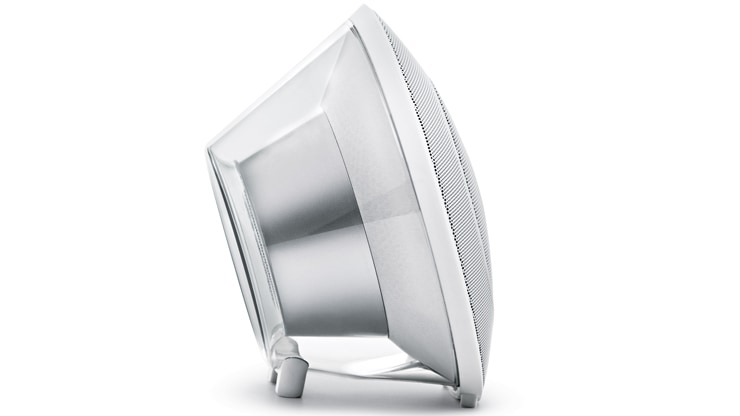With a speaker designed for all kinds of customers, JBL has pretty much flooded the speaker segment with their innovative designs. Now, there is one more and it is even more special than the rest. It’s called the Voyager and JBL claims it to be an exclusive design. The speaker is meant for both, home and outdoor use. It comes with two units, a portable speakers and a dock that doubles as a woofer. Put together, the Voyager should produce an impressive experience. It’s like a 2.1 speaker, according to JBL. With the speaker separated, you get the benefit of moving around your house and playing music anywhere you like. The Voyager is priced at around Rs. 12,000*, and for that you get the best of both worlds. We’re curious to know how the Voyager performs compared to other speakers.
Design and Build
JBL don’t seem to be exaggerating when they talk about the Voyager’s exclusive design. We haven’t seen any Bluetooth speaker that even comes close to its innovative design. The speaker is designed for both home and portable use. With portable speaker connected to the dock, it looks like a simple circular speaker driver. Because of that, it looks pretty simplistic. There is a metallic grill at the front, which makes it sturdy and gives it a premium look. The speaker is available in two colours, white and black. We had the white variant, which looked good but we reckon it will get dirty easily.

The portable speaker gets docked right in the centre. It latches on to the dock with the help of magnetic pins at the back that also charge the speakers. It’ pretty easy to detach. All it requires is a simple push at the bottom and the portable speaker pops out. However, the magnetic pins are still strong enough to hold the speaker, even when you face the Voyager to the floor.

The portable speaker looks like a saucer. It weighs around 420g and fits easily into one hand. The silver brushed glossy finish around the edge speaks about its tough build and the premium look. JBL certainly has paid attention to detail. At the centre, there is a rubber padding, which has all the buttons embedded under it. You have Bluetooth button, power switch, volume rocker keys and the call button. There are small LEDs placed underneath the controls that indicate charge. The portable speaker also comes with a USB port that is used to charge the speakers when used individually. The dock is said to sit in one place. With the speaker attached, it weighs a good 1.2 kg. AT the back the amplifier is covers by glass. The dock has four stands at the bottom that help reduce vibrations created by the woofer.
Features
Together the speaker has a total power output of 30W. The output gets split between the two 1.5-inch drivers on the speakers and the subwoofer/dock. It’s essentially a 2.1 speaker which looks pretty good on the power front compared to similar computer speakers. The signal-to-noise ratio is 80dB which is also decent. Like all other brands, JBL also quotes a frequency ratio of 20 – 20kHz. We’ll find out if it really works that well. Without the speakers connected, the dock cannot play music. It also needs to be plugged into the power source at all times, using the charger. Without the dock, the portable speaker is said to have a battery life of 5 hours, which is good if you only plan on using it around the house. It’s also good that it’s compatible with most smartphone chargers.

Bluetooth is one way of playing music through a smartphone or a tablet. The other source you have is a 3.5mm auxiliary cable that connects to the dock.
Next to the 3.5mm jack on the subwoofer, there is a USB port that can be used to charge your smartphone or tablet while it’s playing music. Like other portable speakers, you can also use the Voyager to attend calls on your smartphone when connected to the speaker. JBL claims to have equipped the speakers with their SoundClear echo cancellation technology, which as the name suggests, eliminates background noise and echo to offer a clear audio experience, when making a call.
Performance
We tested the Voyager with the speaker connected to the woofer unit. Here we played a number of songs from different genres to get a feel of its performance against other 2.1 speakers. The first thing you’ll notice about the Voyager is heavy lows. They are loud and clear, have lot of depth in them. With its loud output, the Voyager can easily let you host parties in your living room. However, too much of something can also be a problem sometimes. In some heavy electronic songs like ‘Divinity’ from Porter Robinson, the lows pretty much overpower the mids. The loud thumps are heard but the details weren’t present. Another major issue we had was the distortion. There was lots of it and it gets louder as the volume increases. High frequencies were great, sounding sharp and crisp. You’ll hear very less distortion. That said, if you are really interested in heavy resonating bass effects and not the detail, then the Voyager is a good speaker for you.

After playing some heavy tracks, we switched over to the late B.B. King’s tracks. The track we used was ‘3 o’clock in the morning’. The volume was also reduced for a clear in order to get a clear output. We loved the performance of the speaker here. With very less bass to handle, every detail in the song could be heard clearly. The guitar solo sounded mesmerising, as did the vocals. Unplugging the speaker from the dock didn’t turn out so well. The speaker fails to distinguish between the mids and the lows. As a result, the bass heavy songs seemed to lose their depth. Distortion also got a lot more noticeable in the highs, especially at the maximum volume. In comparison, we didn’t find the portable speaker better than any of the other Bluetooth speakers we’ve reviewed recently. The only area where it is better is its loud output. We were able to stream music on the Voyager from a distance of 30 feet, which is good and even at that distance we were able to hear the speaker clearly. We also made a few calls with the help of the speaker, which was decent. The person speaking on the speaker could hear the other person clearly, but the voice coming from the speaker was very low. You have to keep the speaker close to you in order for the other person to hear you clearly.
Verdict

The JBL Voyager is a good Bluetooth speaker, but only when the dock is connected. It’s loud, produces great bass and looks good. These are all the qualities you would want in a speaker at home. The portable speaker alone doesn’t offer a great experience. It’s a good feature but we only recommend it for basic use and for making calls. We wouldn’t compare the Voyager to a typical 2.1 computer speaker. We wouldn’t recommend it for a computer either. It has no channel separation, which doesn’t make it good for watching movies. On the flipside it is very good for music. We would still like to see it come with a lower price tag. A price of Rs. 12,000* sounds too much for the kind of output it offers, considering you can get decent speakers for the a lot less. However if you’re a fan of the design then you have no other option but the Voyager.



